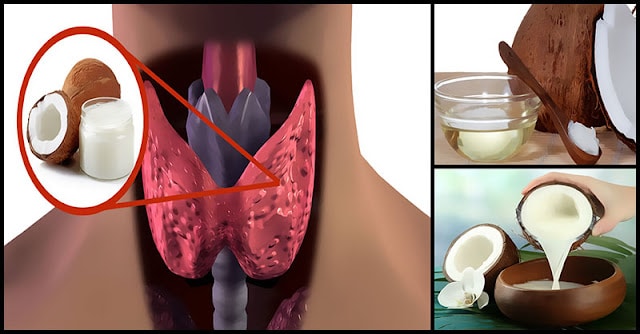Coconut oil can be used to treat hypothyroidism, or an underactive thyroid, to a great extent. However, for other thyroid problems, coconut oil is not that effective.
One of the largest endocrine glands in the body is the thyroid gland. It produces the hormones thyroxine (T4) and triiodothyronine (T3) which works together to regulate metabolism, mood, body temperature, energy levels, blood pressure, and heart rate.
What Is Hypothyroidism?
Hypothyroidism, also called underactive thyroid or low thyroid means the thyroid gland does not produce enough thyroid hormones.
Low levels of thyroid hormones lead to the failure of the body in performing metabolic functions, such as regulation of several chemicals in the body, proper use of energy from food products, and maintenance of healthy cells, bones, and muscles.
Untreated hypothyroidism can lead to weight gain, constipation, general weakness, increased sensitivity to cold, joint pain, infertility, fatigue, weak nails, heart disease, dry skin, brittle hair, and heavier menstrual flow.
When it comes to alternative medicines, coconut oil benefits some symptoms of hypothyroidism.
Coconut Oil And Hypothyroidism
The benefits of coconut oil in hypothyroidism are simply due to its unique medium-chain fatty acid profile.
Lauric acid, which is a type of medium-chain triglyceride, is the same as those in human mother’s milk. It has antimicrobial and anti-inflammatory properties.
Caprylic acid, another fatty acid that coconut oil contains, is also found in breast milk. It has lots of health-promoting properties and can treat yeast-like fungus in the intestines.
Another one is capric acid, which has potent antiviral and antimicrobial properties.
Here are some of the ways that coconut oil helps to treat problems related to hypothyroidism.
Fights Inflammation
Low thyroid hormones cause inflammation in the body, thereby people suffering from hypothyroidism often experience muscle and joint pain.
Coconut oil is considered highly effective in the treatment of hypothyroidism since it has a direct effect in suppressing inflammation and repairing tissues
Massage the affected areas with warm coconut oil a few times daily to lessen muscle and joint pain.
Aids Weight Loss
The most common symptom of low thyroid hormone is weight gain.
Weight loss is not an easy task if you have hypothyroidism as the hormone can directly impact your metabolism.
Coconut oil can help with weight loss. Due to the medium-chain fatty acids found in coconut oil, it can help with weight loss.
Regular intake of coconut oil can help promote weight loss.
Boosts Metabolism
Thyroid hormones play a key role in how your cells function and affect your metabolism level. Constant tiredness, fatigue, and less energy are the results of an underactive thyroid. With coconut oil, you can combat these symptoms.
The medium-chain fatty acids in coconut oil enter easily into the mitochondria – the cells’ energy-burning powerhouses.
From here, the fats are converted to energy which in return, gives a boost to your metabolism and even raises the basal body temperature, which is important for those dealing with low thyroid.
Moreover, when the lauric acid found in coconut oil is ingested, it gets converted into monolaurin, which has antiviral, antibacterial and antiprotozoal properties. This improves your immunity and metabolism.
Prevents Hair Loss
Failure of the thyroid gland to work properly can be noticed in hair growth, eyebrows, and body hair.
The lauric acid in coconut oil has a high affinity for hair proteins and due to its low molecular weight and straight linear chain, it is able to penetrate inside the hair shaft.
To treat hair loss and other hair-related issues, use warm extra-virgin coconut oil to massage your scalp for about 5 minutes. Leave it on overnight. Wash your hair the next morning with a mild shampoo. Do this a few times a week.
Relieves Constipation
With low levels of thyroid hormones, the functioning of the digestive tract slows down and this includes the small and large intestines.
Furthermore, it contributes to the weakening of the contraction of muscles lining the digestive tract and does not allow stool to move easily through the intestine, thus leading to constipation.
The medium-chain fatty acids in coconut oil provide the energy needed by the intestinal cells to boost their metabolism and stimulate bowel movements. It also works as a natural laxative, which helps soften your stool.
Add 1 teaspoon of extra-virgin coconut oil to a glass of warm milk and drink it daily before going to bed. This will help maintain regularity.
Treats Dry And Flaky Skin
Hypothyroidism is commonly associated with d dry, flaky and itchy skin.
The slowed metabolism due to an underactive thyroid causes reduced sweating, thus leading to dry skin.
Coconut oil is highly effective in getting rid of this dry and itchy skin. The fatty acids in it help restore the lost moisture and improve skin health.
Apply warm coconut oil over your dry and itchy skin and massage for 10 minutes. Wait 30 minutes, then take a bath. Do this daily.
How Much Coconut Oil To Consume?
You must use only extra-virgin coconut oil for thyroid problems. You can consume 2 to 4 tablespoons a day. Some of the ways you can include this oil in your diet are by:
- Using it in your daily cooking.
- Adding extra-virgin coconut oil to hot milk, tea, or coffee.
- Adding it to smoothies and drizzle it over your salad or soup.









